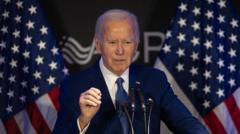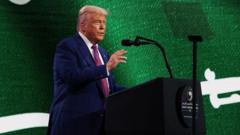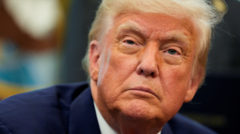The meeting signals an end to decades of diplomatic isolation for Syria as the two leaders discuss potential sanctions relief and regional stability.
**Historic Meeting: Trump and Syria's New President Ahmed al-Shara Connect in Riyadh**

**Historic Meeting: Trump and Syria's New President Ahmed al-Shara Connect in Riyadh**
In a groundbreaking diplomatic shift, former President Trump meets with Syria's President Ahmed al-Shara, marking a significant change in U.S. policy towards Syria.
President Trump attended a historic meeting on Wednesday with Syria's newly appointed President Ahmed al-Shara in Riyadh, Saudi Arabia, following the announcement that the United States would lift sanctions on Syria—an unprecedented policy shift after decades of diplomatic isolation. This significant meeting, the first between leaders of the two nations in 25 years, underscores a transformative moment for Syria as it seeks to reintegrate into the international community.
The roughly thirty-minute encounter occurred just before a summit involving key officials from six Arab nations. Trump's discussions with al-Shara were encouraged by Crown Prince Mohammed bin Salman, who also participated in the meeting alongside Turkish President Recep Tayyip Erdogan, who connected by phone. As they conversed, Trump emphasized the unique chance al-Shara has to foster historical changes within the strife-torn nation.
Al-Shara's leadership follows a significant uprising that saw Bashar al-Assad ousted in December, amidst enduring sanctions that have crippled the Syrian economy. The U.S. had previously been skeptical of Al-Shara's commitment to reform, but Trump's meeting indicates a willingness to reconsider this stance.
The Syrian Foreign Ministry hailed the event as "historic," while U.S. press secretary Karoline Leavitt noted that Trump encouraged al-Shara to normalize ties with Israel and urged him to expel foreign terrorist elements from Syria. This meeting represents a pivotal step towards broader political stability in the Middle East, as both Trump and regional leaders advocate for de-escalation and economic revival.
Trump's discussions in Riyadh are part of a four-day tour that also emphasizes business partnerships, particularly in defense and technology sectors that underscore America's role in the Gulf region. The lifting of sanctions is perceived by Gulf nations as essential to prevent potential destabilization and conflicts that could spill over borders, fostering support among regional players eager to see Syria pursue economic rehabilitation.
This landmark dialogue and the subsequent reactions from both U.S. and Saudi officials illustrate a robust commitment to recalibrating relations amid ongoing regional transformations, with the potential to influence future diplomatic dealings in the volatile landscape of the Middle East.
The roughly thirty-minute encounter occurred just before a summit involving key officials from six Arab nations. Trump's discussions with al-Shara were encouraged by Crown Prince Mohammed bin Salman, who also participated in the meeting alongside Turkish President Recep Tayyip Erdogan, who connected by phone. As they conversed, Trump emphasized the unique chance al-Shara has to foster historical changes within the strife-torn nation.
Al-Shara's leadership follows a significant uprising that saw Bashar al-Assad ousted in December, amidst enduring sanctions that have crippled the Syrian economy. The U.S. had previously been skeptical of Al-Shara's commitment to reform, but Trump's meeting indicates a willingness to reconsider this stance.
The Syrian Foreign Ministry hailed the event as "historic," while U.S. press secretary Karoline Leavitt noted that Trump encouraged al-Shara to normalize ties with Israel and urged him to expel foreign terrorist elements from Syria. This meeting represents a pivotal step towards broader political stability in the Middle East, as both Trump and regional leaders advocate for de-escalation and economic revival.
Trump's discussions in Riyadh are part of a four-day tour that also emphasizes business partnerships, particularly in defense and technology sectors that underscore America's role in the Gulf region. The lifting of sanctions is perceived by Gulf nations as essential to prevent potential destabilization and conflicts that could spill over borders, fostering support among regional players eager to see Syria pursue economic rehabilitation.
This landmark dialogue and the subsequent reactions from both U.S. and Saudi officials illustrate a robust commitment to recalibrating relations amid ongoing regional transformations, with the potential to influence future diplomatic dealings in the volatile landscape of the Middle East.






















